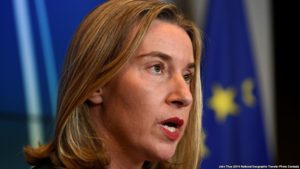Special to WorldTribune.com
Radio Free Europe / Radio Liberty
European Union foreign ministers have closed ranks in support of the Iran nuclear agreement, warning that U.S. President Donald Trump’s threats to abandon the multinational accord jeopardize efforts to find a peaceful solution to the nuclear standoff with North Korea.
“At a time of acute nuclear threat the EU is determined to preserve the JCPOA as a key pillar of the international nonproliferation architecture,” the ministers said in a joint statement issued during a meeting in Luxembourg, referring to the 2015 Joint Comprehensive Plan of Action (JCPOA) between Tehran and six world powers.

Under the deal, Tehran agreed to curtail its nuclear activities in exchange for relief from international sanctions. Other signatories to the accord are Russia, China, Britain, France, and Germany.
But in an October 13 speech, Trump said he would not certify that Iran was complying with the nuclear agreement, and warned he might ultimately terminate it.
He accused Tehran of violating the “spirit” of the agreement, in part for its continued testing of ballistic missiles and its support for extremists in the Middle East, and said he would ask Congress to strengthen a U.S. law to put additional pressure on Iran.
The EU foreign ministers said that they consider Trump’s decision “as being in the context of an internal U.S. process.”
They underlined that the International Atomic Energy Agency had verified eight times that Iran “is implementing all its nuclear related commitments following a comprehensive and strict monitoring system.”
They called on the United States to maintain its commitment to the JCPOA and to “consider the implications for the security of the [United States], its partners, and the region before taking further steps.”
They insisted that the lifting of nuclear-related sanctions “strengthens cooperation and allows for continuous dialogue with Iran.”
The Luxembourg meeting is expected to sign off on a new package of EU sanctions aimed at punishing North Korea for its recent nuclear and ballistic-missile tests.
The EU hopes economic pressure will help bring Pyongyang to the bargaining table, but the bloc’s foreign-policy chief, Federica Mogherini, said that weakening the Iran deal “might affect negatively the possibility of opening negotiations or opening even the space for negotiations” with the North Korean leadership.
Mogherini said she would visit Washington early next month to urge U.S. lawmakers not to pull out of the Iran deal, which was aimed to slow Iran’s potential path toward creating a nuclear weapon. Tehran says its nuclear program has purely peaceful aims.
“We must be able to demonstrate that when a nuclear agreement has been concluded that we respect it,” Belgian Foreign Minister Didier Reynders said on the sidelines of the EU Foreign Affairs Council.
His Dutch counterpart, Bert Koenders, said that the agreement concerned “the safety of the world. I hope also that the U.S. Congress will realize this and take the right decisions.”
German Foreign Minister Sigmar Gabriel said the threatened termination of the deal “undermines the credibility of such international treaties,” adding that Trump’s hard-line stance risked dragging the world back to a “military confrontation” with Iran.
“Nonproliferation is a major element of world security and rupturing that would be extremely damaging,” French Foreign Minister Jean-Yves Le Drian told reporters. “We hope that Congress does not put this accord in jeopardy.”
In a joint statement on October 13, the leaders of France, Britain, and Germany said the deal remained “in our shared national security interest.”
Russia and China also voiced their support for the agreement.
Tehran said it will remain committed to the deal as long as it serves the country’s national interests.
